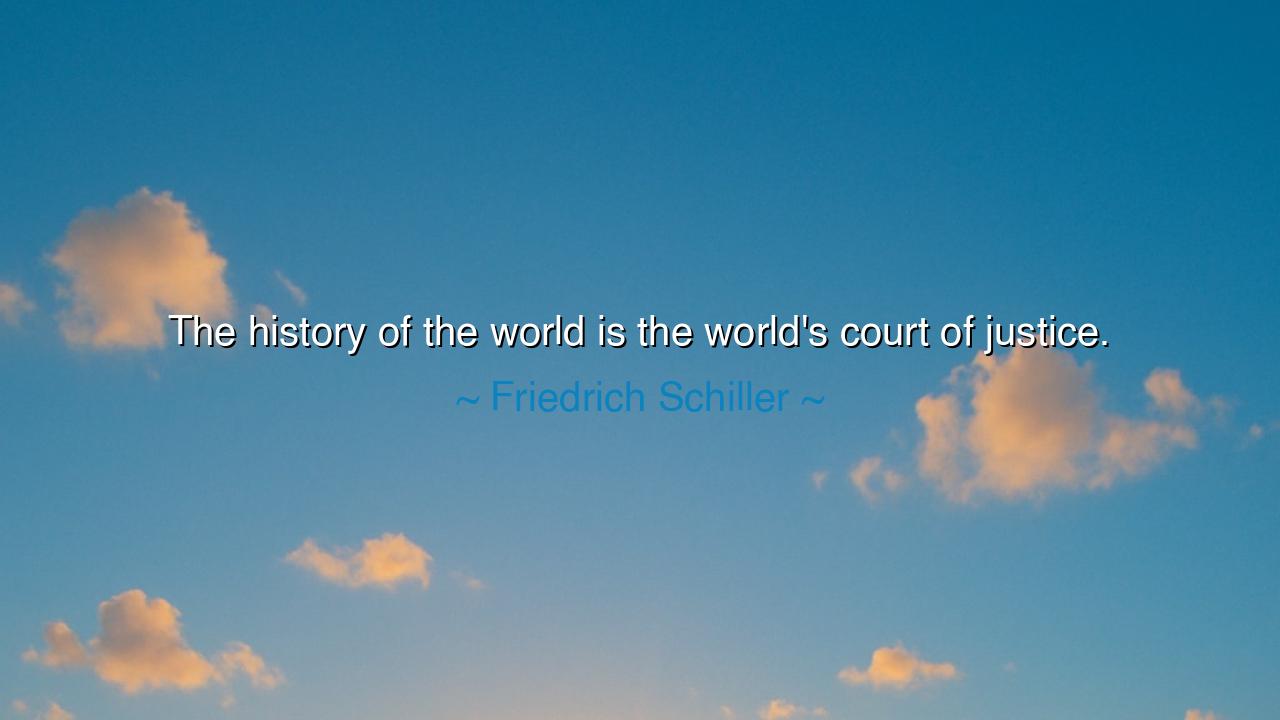
The history of the world is the world's court of justice.






In the solemn cadence of time, where empires rise and crumble, and the deeds of mortals echo beyond the grave, Friedrich Schiller declared, “The history of the world is the world’s court of justice.” These words, forged in the fire of philosophy and tempered by the weight of history, speak not of a court made by men, but of a higher tribunal—the judgment of time itself. Kings may rule with might, tyrants may silence the tongues of truth, and nations may be blinded by pride, but none can escape the verdict of history. For in the end, when all noise has faded, the past stands as the judge, and every deed, whether noble or cruel, is called to account.
To the ancients, justice was not merely the decree of a king—it was a force woven into the fabric of the universe. The Greeks called it Dike, the Romans named it Justitia, and the poets spoke of it as the balance of fate itself. Schiller, steeped in their wisdom, understood that the story of humankind is itself a mirror of divine judgment. When he wrote these words, he was not merely observing the march of events, but revealing a profound moral law: that truth and virtue may falter for a moment, but they triumph in eternity. History remembers not the roar of power, but the whisper of righteousness.
Consider the tale of Socrates, condemned to death by the city he sought to enlighten. In his time, the court of Athens declared him guilty; his words were silenced, his body slain. Yet, centuries later, the court of history reversed the verdict. The names of his accusers have turned to dust, but his wisdom lives on in the minds of generations. Such is the justice of history—it may move slowly, but it moves with certainty. The deeds of injustice that seem victorious in the moment are later revealed for what they are: shadows fleeing before the dawn.
So it has ever been. The tyrants of Rome who slew the innocent for spectacle; the monarchs who built their empires upon the backs of the enslaved; the conquerors who thought their cruelty would be forgotten—all were judged, not by their courts, but by the chronicles of time. History itself became the witness, the prosecutor, and the judge. It wrote their legacies not in gold, but in the ashes of their pride. And yet, it also exalted those who served humanity with compassion and courage—the saints, the thinkers, the reformers who stood against injustice when the cost was everything.
Schiller’s words remind us that no act is lost, and no generation lives in isolation. Each deed, each choice, each thought, contributes to the grand tapestry of time. What we do now will one day be weighed upon the scales of remembrance. Will we be found worthy? Will our age be recalled as one of wisdom or of blindness? These are not idle questions—they are the moral summons of history’s court, where all of humanity stands accused or redeemed by its own record.
There is a lesson here for every soul: live as though history is watching, for indeed it is. Do not seek approval from the moment, for the applause of the present fades swiftly; seek instead the quiet honor of truth, which endures. Let your actions be just, not because they are praised, but because they are right. When you speak, speak with integrity, for one day your words will echo in the memory of generations unborn. When you act, act with mercy, for one day your choices will stand as testimony in the eternal record of humankind.
And thus, Schiller’s wisdom endures like a flame passed from age to age: History is the world’s court of justice, and we are all its witnesses, its defendants, and its judges. The temples of power will fall, but the chronicles of conscience will remain. So walk in righteousness, O seeker of truth, for though the present may misunderstand you, the future will remember. Time is the final arbiter, and in its unerring gaze, all falsehood is unmasked, all virtue is crowned, and all souls are seen for what they truly are.






AAdministratorAdministrator
Welcome, honored guests. Please leave a comment, we will respond soon